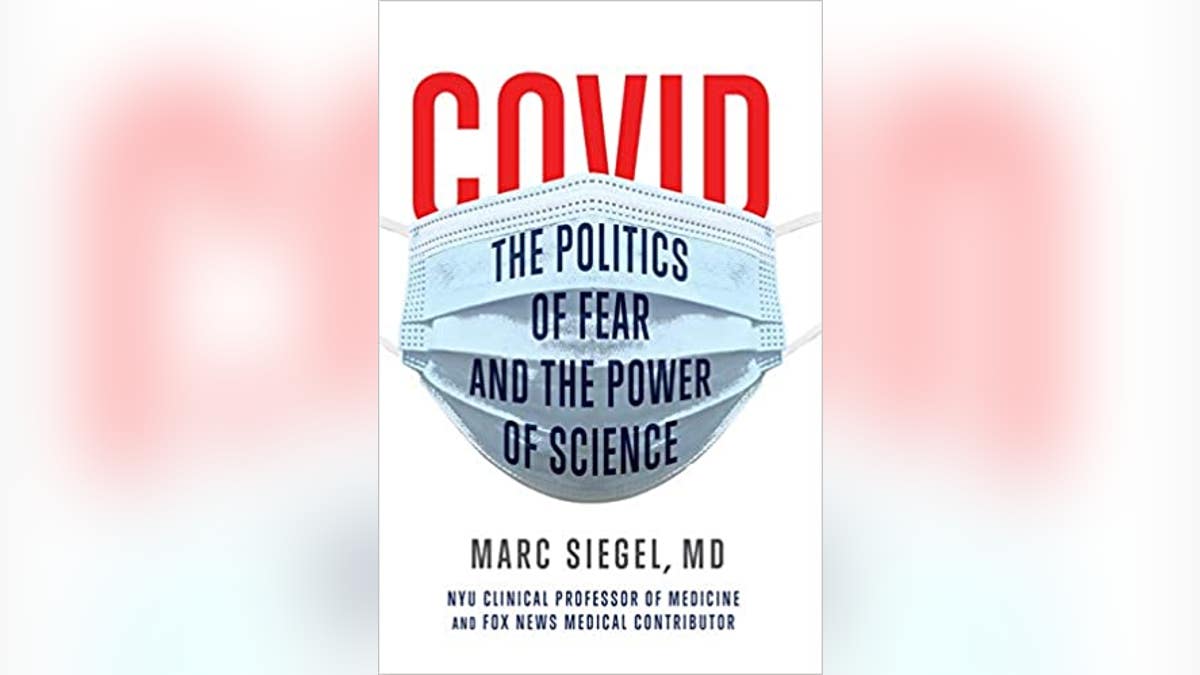Dr. Siegel: Trump using 'team of rivals' task force to battle COVID-19
Fox News medical contributor calls out politicians using pandemic to 'bludgeon' opponents on 'Tucker Carlson Tonight'
We must conquer our fear of COVID-19 in order to help us defeat it.
As I describe in my new book “COVID, the Politics of Fear and the Power of Science,” fear is far more all-consuming than the rational strategies we use to combat it.
In my book, I discuss a journalist friend with Type A blood who has called me at intervals throughout the coronavirus pandemic. She is petrified each time the news media report on a study that indicates her chances of getting COVID-19 and becoming severely ill may be far greater than for someone with Type O blood.
STUDY SUGGESTS CORONAVIRUS IMMUNITY DROPS AFTER 3 MONTHS
Susceptibility is based on interactions between the virus and the infected person that are still being studied. In the meantime, knowing that she has Type A blood, my friend’s perception of her personal risk is far greater than her actual risk — because of her fear.
Fear confounds, dilates, and complicates our reaction to COVID-19, and it interferes with our perception of the science as well.
More from Opinion
My friend fears that every tickle or cough she experiences is COVID-19. She has a young son at home and she worries for his future. I have done my best to reassure her. But this reassurance becomes more difficult each time there is a new study.
The coronavirus that causes COVID-19 is highly transmissible, but the impact it has on the body varies considerably from one person to the next. It is this unpredictability that scares us the most.
Though we have learned that COVID-19 predominantly causes an inflammatory blood clotting response in the obese and the elderly — and also poses a higher risk to people with certain medical conditions, such as diabetes — we have also learned that a short course of the disease can lead to unexpected complications later on in life, not just to the lungs, but to all our major organs.

The microscopic coronavirus is an invisible enemy that can spread easily and can kill us. This combination has transfixed and petrified us for months. And since the disease arrived in the U.S. in a presidential election year, it has inevitably become a major issue in the campaign between President Trump and his Democratic opponent, former Vice President Joe Biden.
President Trump assembled a Lincolnesque “team of rivals” back in March to inform him about the then-emerging virus. They did not always agree with each other, and as we learned more about COVID-19 their advice sometimes changed to keep up with the science.
The contrast between the approaches Trump and Biden have taken to dealing with the pandemic is stark.
Trump said at last week’s presidential debate that we “have to open the country,” that the U.S. is “rounding the turn” in the fight against COVID-19, and that we have to learn to live with the virus (as he did after contracting COVID-19).
Biden, on the other hand, struck a message of fear, warning of a “dark winter.”
Biden is not alone. Many scientists echo the former vice president’s concern that the worst may be yet to come, as new case numbers of people testing positive for COVID-19 soar to over 80,000 per day, and hospitalizations rise over 40,000 nationwide.
Biden is in favor of expanded testing and national guidance for schools and businesses on whether they should be open or closed, while urging every governor to impose a mask mandate.
Masks — especially when worn properly in close quarters — clearly have a public health value. But will an across-the-board mandate work or will it simply spread more fear, especially in places where the coronavirus is not widespread?
Where Biden appears most vulnerable is when he says: “I’m going to shut down the virus, not the country.” How exactly can this be accomplished? In the process of stomping down the virus, Biden could inflict grave economic harm on our country and on struggling Americans out of work and businesses unable to keep operating.
Fear as a method to control us hasn’t worked well so far and has also damaged us not just economically, but also physically and emotionally.
Trump’s opponents are too quick to dismiss how far we have come in seven months of this pandemic in terms of prevention, early identification and treatment.
We have developed rapid testing of both the antibody and antigen kind. The gold standard polymerase chain reaction test that looks for coronavirus genetic material can now be accompanied with what is known as a cycle threshold, a measurement that helps determine not only how contagious the virus is but also how severe the course of a bout of COVID-19 may be.
We have a growing number of tools in our arsenal against COVID-19. Patients taking the stomach antacid famotidine (the generic name for Pepcid) appear to do better, as well as those who have normal vitamin D levels.
CLICK HERE TO SIGN UP FOR OUR OPINION NEWSLETTER
Dexamethasone and proper ventilator management save the lives of COVID-19 patients who are hospitalized. And the just-approved anti-viral drug remdesivir — as well as various monoclonal antibodies against the virus (still in clinical trials) — appear to save lives early before the coronavirus has had a chance to replicate and cause the inflammatory and blood clotting effects that we so fear.
National Institutes of Health Director Dr. Francis Collins, who is one of the top geneticists in the world, told me in an interview that there is a genetic variation in susceptibility to severe COVID-19 from one person to the next. Dr. Collins cited differences in the way interferon (a protein we make to help block viral spread from cell to cell) works that may led to an exciting new therapeutic.
Useful vaccines able to protect most people contracting COVID-19 are now undergoing clinical trials and appear to be only a few months away from development. Once vaccines that the Food and Drug Administration determines are safe and effective are given to a large percentage of the population, we should be able to develop herd immunity from the disease.
CLICK HERE TO GET THE FOX NEWS APP
When we have FDA-approved vaccines, all elected officials — regardless of political party —
should line up in support of FDA recommendations and urge all Americans who the FDA says can safely get vaccinated to do so. This is vitally important, because widespread vaccinations will be needed to end the pandemic.
Right now we must focus our attention on complying with distancing, disinfecting and masking to combat the spread of COVID-19. We should avoid the politics of fear that erodes our confidence in the war against the coronavirus. We must neither deny the value of masks nor embrace them dogmatically as a religion.











































